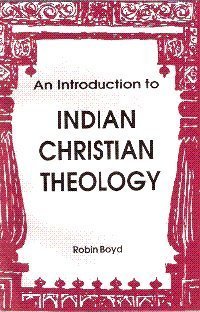 An Introduction to
Indian Christian Theology
An Introduction to
Indian Christian Theology
Robin H. S. Boyed
ISPCK,
2004 ISBN
788172141936, Pages
361
One
common and popular definition of theology is simply “faith seeking
understanding.” For some theology is always a reflection of the context. When
faith from its context seeks for an understanding it is called “Contextual
Theology”.
Dr Boyd was a missionary
of the Irish Presbyterian Church and Vice-Principal of the Gujarat United
School of Theology. He has already put the Church in his debt by several
outstanding books. This book is basically
author's doctoral thesis presented to Edinburgh University in 1966. The revised
edition accommodates new material on several theologians which not mentioned in
the first edition.
Some of the main features
in contents are as such; Sources of theological tradition
(the Syrian tradition, Robert De Nobili tradition and the protestant tradition).
The gospel and Indian Renaissance; Ram Mohan Roy, Keshab Chandra Sen.
The rational refutation of Hinduism; Nehemiah Goreh. Nothing but the highest;
Brahmbandhab Upadhay. Preparation for dialogue; P.D. Devanandan. Indian
Theology Today; Surjit Singh, S. Kulandran, Dhanjibhai Fakirbhai, Raymond
Panikkar. Types and terms of Indian theological thought; the source of
authority, the logic of Indian theology, words for God, God and the world,
Words for Christ, Words for Spirit, Man and Sin, The Work of Christ etc. The
assessment and a prospect; the emergent of Indian theology, what is Indian
theology, Christian theology and Hinduism.
He takes effort to
separately analyze each theologian, which is quite helpful to readers. Boyd's laborious and explicit study of the past
forgotten, almost lost writings of
insignificant Indians and his
considerate but well legitimate interpretations, in doing so he
pioneers the study in two pivotal respects. First, he actually highlighted all
those disremembered theology in the context of India. Second, he looked at
these theologies as the product of an attempt of local churches of Indian to
make gospel admissible to the hard grounds of India, and then he also analysis
it in terms of future Indian mission. We have had studies of Indian
theologians; but in these studies they were made to stand out and apart from
the life and mission of the Indian Church, more or less as unexpected freaks of
nature.
Author has critically
analyzed and tries to adjust its counterpart in the first century church. He
proves that the people like Chennchaiya, Appasamy, Brahmbanadh etc are the
proper evidence for the emergent of theology in India. He also has something
very pivotal to comment on the Hindu religion, author sees it as ongoing
journey to arrive at something more real, personal and final curtain that is
Christ Jesus. His immense collection of material as an important resource for anyone who
is seeking to learn and study the Indian Christian theology, makes Boyed a pioneer
in
this
field.
Introduction to Indian Christian Theology is a very persuasive presentation of
the Gospel for Indian inquirers.
From a critical point of
view, he should have also talked about what these theologies actually mean in
their own context or whether there is any relevance today? Another important
feature to be noticed is that the most of the interpretations are western in
their approaches. So he proves that no matter how you deal with these theologies,
one is bound to analyze it from western optics.
However, I confidently
suggest this book to any reader who really finds interest in knowing the
historicity and complexity of Indian Christian theology. And also it is a must
read to the learners of contextual theology, especially that of the Indian.










0 comments:
Post a Comment